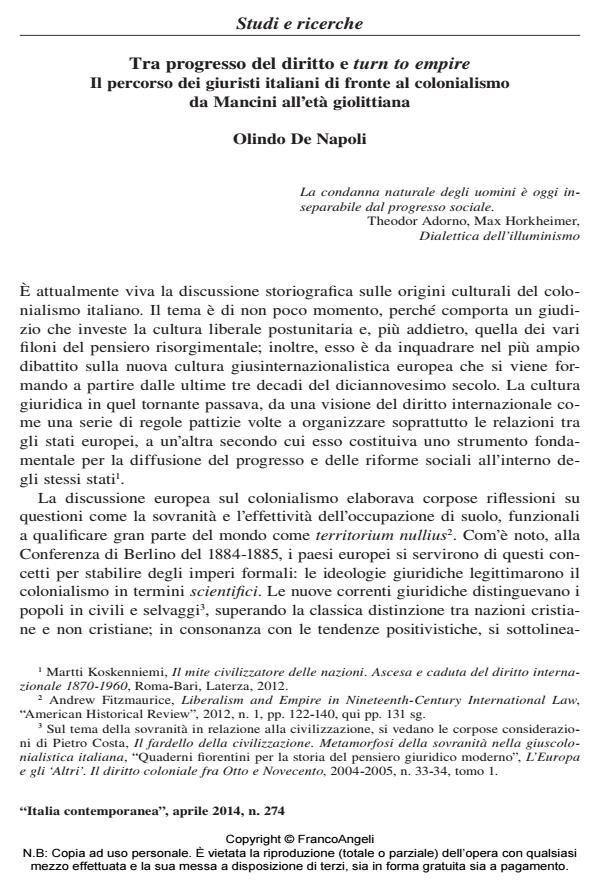Between the progress of right and the "turn to empire". The Italian jurists faced with colonialism from Mancini to Giolitti’s times
Journal title ITALIA CONTEMPORANEA
Author/s Olindo De Napoli
Publishing Year 2014 Issue 2014/274
Language Italian Pages 35 P. 7-41 File size 787 KB
DOI 10.3280/IC2014-274001
DOI is like a bar code for intellectual property: to have more infomation
click here
Below, you can see the article first page
If you want to buy this article in PDF format, you can do it, following the instructions to buy download credits

FrancoAngeli is member of Publishers International Linking Association, Inc (PILA), a not-for-profit association which run the CrossRef service enabling links to and from online scholarly content.
This essay explains how deeply Italian colonialism was rooted in the international juridical background of its times. The Italian case is generally connoted by the passage from a sense of "moral restraint" the heirs of the Risorgimento felt toward colonial adventures, right down to a full participation in the colonial "generous competition" among the great European nations - to voice it with Pasquale Stanislao Mancini, then Minister for foreign affairs. Actually, the beginnings of Italian colonialism did not imply a repudiation of the ideals of national freedom and progress, but rather a sort of continuity with them, as attested by the very thought of Mancini himself, one of the most acclaimed scholars of international law at the time. Parliamentary papers, juridical essays and archival sources lead the A. to trace back Mancini’s peculiar mix of progressive stance and colonialist option to the current internationally known as "liberal imperialism". Only later, by the end of the century, will the Italian juridical culture live its true "turn to empire", an imperialistic turn marked by the prevalence of the theories of domination.
Keywords: Italian colonialism, International law, Pasquale Stanislao Mancini, legal culture, progress, liberal imperialism
- Duncan Bell, Empire and International Relations in Victorian Political Thought, “The Historical Journal”, 2006, n. 1. DOI: 10.1017/S0018246X0500513
- Andrew Fitzmaurice, Liberalism and Empire in Nineteenth-Century International Law, “American Historical Review”, 2012, n. 1. DOI: 10.1086/ahr.117.1.12
- Peter M. Haas, Epistemic Communities and International Policy Coordination, “International Organization”, 1992, n. 1. DOI: 10.1017/S002081830000144
- Krishan Kumar, Greece and Rome in the British Empire. Contrasting Role Models, “Journal of British Studies”, 2012, n. 1. DOI: 10.2307/2326525
- Luigi Nuzzo, Disordine politico e ordine giuridico. Iniziative e utopie del diritto internazionale di fine Ottocento, “Materiali per una storia della cultura giuridica”, 2011, n. 2. DOI: 10.1436/3595
- Teodoro Tagliaferri, Storia e profezia politica nella visione imperiale di John R. Seeley, “Ricerche di storia politica”, 2007, n. 3. DOI: 10.1412/2543
- Elena Bacchin, Il Risorgimento oltremanica. Nazionalismo cosmopolita nei meeting britannici di metà Ottocento, “Contemporanea”, 2011, n. 2. DOI: 10.1409/3449
- For a ‘normal government’ of the colony: Antonio Gandolfi and the first administration of Eritrea (1890–1892) Olindo De Napoli, in Journal of Modern Italian Studies /2017 pp.450
DOI: 10.1080/1354571X.2017.1350023
Olindo De Napoli, Tra progresso del diritto e turn to empire Il percorso dei giuristi italiani di fronte al colonialismo da Mancini all’età giolittiana in "ITALIA CONTEMPORANEA" 274/2014, pp 7-41, DOI: 10.3280/IC2014-274001